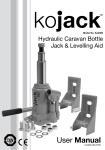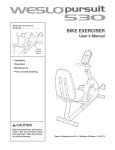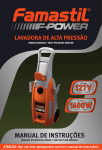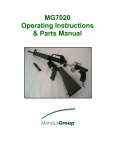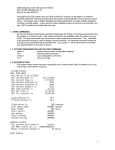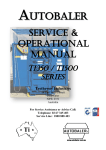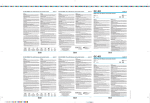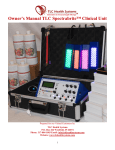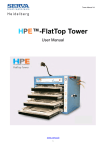Download KJ1000 Operating Instructions & Parts Manual
Transcript
KJ1000 Operating Instructions & Parts Manual NSN 1025-01-473-8886 ISO 9001 Certified June 2004 MANDUS GROUP Rev. 2/11 Mandus Group Ltd. KJ1000 Operators Manual TABLE OF CONTENTS General Safety Instructions ......................................................................Page 1, 2 Operator Instructions ................................................................................Page 3, 4 KJ1000 Repair Parts List..............................................................................Page 5 KJ1000 Repair Parts List Description ..........................................................Page 6 Nitrogen Reclaiming Instructions .........................................................Page 7, 8, 9 Trouble Shooting Procedures .....................................................................Page 10 Electrical Schematic ...................................................................................Page 11 KJ1000 Optional Products List .............................................................Page 12, 13 KJ4000 Information Data............................................................................Page 14 KJ4000 Optional Products List ...................................................................Page 15 Warranty Information ..................................................................................Page 16 GENERAL SAFETY INFORMATION 1. DO NOT operate the KJ1000 or any of its components without first reading and understanding all the operating instructions first. 2. DO NOT operate the KJ1000 unless the oil level in the reservoir is 1/2 inch from the top of the reservoir. 3. DO NOT operate the KJ1000 at temperatures greater than 110 degrees F or less than 5 degrees F. 4. DO NOT operate the KJ1000 on less than a 20 amp service. 5. DO NOT attempt to apply more than 2500 psi anywhere to the KJ1000. 6. DO NOT attempt to lift the KJ1000 with less than two men. The KJ1000 weighs approx. 175 lbs. 7. DO NOT attempt to use the KJ1000 and its accessories in any way other than their intended use. 8. NEVER USE any oil in the KJ1000 other than the specified oil. GENERAL MAINTENANCE INFORMATION 1. Inspect all oil lines and connections twice a year for any cracks, leaks, or excessive wear. 2. Inspect electric cord once a year for any excessive wear, cracks, or exposed wires. 3. Change oil every 2 years. 4. Change Nitrogen Extraction filter yearly. 5. Inspect heat exchanger cooling fins once yearly for damage and dirt. Clean with air hose if necessary. 6. If a blowing oil mist is ever present when disconnecting Schrader Valves at equilibrators or at the recuperator, the following steps may need to be taken: Step 1. Replace gas filter element in the Nitrogen Extraction Kit and determine if blowing oil mist stops. If it does not, perform step 2. Step 2. Contact Mandus Group, Ltd. for accumulator bladder replacement. Page 1 MANDUS GROUP 888-922-8502 SAFETY INSTRUCTIONS SUMMARY: The following are general safety precautions that are not related to any specific procedures and therefore do not appear else where in this manual. These are general safety precautions that operators and maintenance personnel must understand and apply during many phases of operation and maintenance to ensure personal safety and protection of the equipment. Throughout this manual, three types of notations are provided which contain special information: NOTE: Provides additional information that may be helpful in performing a specific task. CAUTION: Provides information about conditions which require special attention and precautions to avoid serious or fatal injuries. WARNING: Provides information about conditions which require special attention and precautions to avoid serious or fatal injuries. GUIDELINES FOR HANDLING COMPRESSED GAS CYLINDERS • Nitrogen cylinders are under extremely high pressure (up to 2500psi) and present a number of associated hazards as a result. • The sudden release of the cylinder pressure, whether by puncture, damage to a valve caused by dropping or other means can turn the cylinder into a missile which can travel along the ground or through the air at high speeds. Take extreme care when filling and handling charged cylinders. • Do not drag or slide the cylinders by the pressure cap, this may cause the sudden release of cylinder pressure. Use a suitable hand truck, fork lift or similar device for handling large cylinders. • Do not drop cylinders or permit them to strike against each other or other surfaces, this may cause the sudden release of pressure. Securely secure the cylinders during filling, storage and transport. • Do not fill cylinders too rapidly; excessive heat may build up in the gas which could result in a failure of the cylinder valve seals and possible fire. Periodically check the surface temperature of the cylinders during charging. • Never charge cylinders with nitrogen that are marked for other gasses. Always check the cylinder markings and ensure that only cylinders marked for nitrogen are charged with nitrogen. Do not use adapters to fill cylinders that do not have the correct fittings for nitrogen. WARNINGS • Improper use of this product may cause severe personal injury of death. Read and understand this manual before using or servicing this product. • Make sure any equipment connected to the KJ1000 is rated for the applicable pneumatic pressure. • Only factory supplied assemblies may be interchanged to repair the KJ1000. Interchange of parts or assemblies between KJ1000 units may result in damaged parts or components and could void warranty. CAUTIONS • Risk of electrical shock. DO NOT remove covers. Refer servicing to qualified service personnel. • Hose fittings must be leak tight. A small leak can severely impair performance of the KJ1000. • If an extension cord must be used to deliver power to the KJ1000 ensure that it is adequately sized and in good repair. • Risk of electrical shock. Refer servicing to qualified service personnel. Page 2 Page 3 OPERATING INSTRUCTIONS & PARTS MANUAL Model KJ1000 Please read and save these instructions. Read carefully before attempting to assemble, install, operate or maintain the product described. Protect yourself and others by observing all safety information. Failure to comply with instructions could result in personal injury and/or property damage! Retain instructions for future reference. KJ1000 Nitrogen Intensifier Description The KJ1000 Nitrogen Intensifier was developed to assist in filling nitrogen vessels. The KJ1000 is designed to utilize and intensify all but 150 PSI of nitrogen from the supply bottle. The KJ1000 accepts nitrogen from a supply source, then intensifies the nitrogen source pressure by means of a hydraulic pump and electric motor. The intensified nitrogen is then forced into an accepting nitrogen vessel. The KJ1000 is engineered to shut down when 150 PSI or less is left in the supply bottle, or when the factory set upper level pressure (1950PSI) is obtained. Unpacking KJ1000 When unpacking the KJ1000, inspect for any loose, missing, or damaged parts. Notify Mandus Group Ltd. as soon as possible if there are missing or damaged parts. KJ1000 uses ISO100 anti-leak, anti-wear, anti-foam or equivalent hydraulic oil. Unit is shipped with oil. General Safety Information 1. Do not use any gas but nitrogen in the KJ1000. 2. Do not operate KJ1000 on less than a 20-amp service. WARNING!!! Do not exceed the maximum input or output pressure of 2500 psi or operate at temperatures lower than 5 degrees F or higher than 110 degrees F. WARNING!!! Never attempt to uncouple the quick connects anywhere on system while it is under pressure. Set-up 1. Remove air chuck and coupling from the customer owned nitrogen charging kit and install the male quick connect provided with the KJ1000 to the end of the hose. Mandus Group Ltd. 2408 4th Avenue Rock Island, IL 61201 1-888-922-8502 www.mandusgroup.com Operating Instructions The KJ1000 requires to be hooked up to a source tank with at least 150 psi (refer to illustration on page 3). The KJ1000 has a pressure switch in it that won’t allow operation unless it has a minimum of 150 psi on the inlet line. There are 2 connection fittings on the KJ1000. They are right next to each other and are clearly marked on the cover as “INLET” and “OUTLET”. The female quick disconnect is the inlet connection on the manifold. The male quick disconnect on the manifold is the outlet. Your source tank should have a regulator on it with a gas line coming off of it. The end of this line must have a male quick disconnect on it to connect to the female quick disconnect on the KJ1000. YOU CANNOT USE A REGULATER ON THE RECEIVING TANK!!! You must use the KJ1044 or KJ1044B. There should be a 15 foot discharge hose with female disconnects on both ends. This hose comes standard with the unit. One end attaches to the KJ1000 and the other end attaches to the receiving tank via the KJ1044 or 1044B. (the KJ1044 (CGA 580) is for tanks up to 3000 psi, the KJ1044B (CGA 680) is for tanks from 3000 psi up to 5500 psi. Once you have both tanks (Source tank and Receiving tank) connected to the KJ1000. Turn the valves on both tanks slowly open until they are wide open. The pressure gage on top of the KJ1000 illustrates the pressure in the receiving tank. Plug the KJ1000 in and press the start button on the hand pendant. The unit should start to run and will continue running until the receiving tank reaches approximately 1850 psi or until you shut machine off. NOTE!! Remove needle valve from the valve stem, if one is present, in the equilibrator crossover line. This allows a more efficient transfer process. NOTE!! Do not use a drop cord of more than 50 feet in length and wire gage of cord should be rated at 12 awg. Failure to follow this information could result in damage to the KJ1000. Page 4 KJ1000 Parts List 3 7 2 4 1 6 5 10 8 9 13 12 11 15 14 16 Page 5 Repair Parts List Ref Number 1 2 3 4 5 6 7 8 9 10 11 12 13 14 15 16 Part Number KJ1000FA KJ1000PU KJ1000EX KJ1000MA KJ1000EK KJ1000AA KJ1000EA KJ1000H1 KJ1000H2 400077LW KJ1000A1 9928070 9928020 KJ1044 KJ1044B KJ1000FE Page 6 Description Frame Assembly Power Unit Assembly Heat Exchanger Assembly Manifold Assembly Extraction Kit Assembly Accumulator Assembly Electrical Assembly Hose Assembly 1 Hose Assembly 2 25 Ft. Drop Cord Adapter Assembly Female Disconnect Male Disconnect Tank Fill Stem (3000 PSI) Tank Fill Stem (5500 PSI) Filter Element INSTRUCTIONS FOR RECLAIMING NITROGEN FROM AN M198 HOWITZER 1. Tank Fill Stem Assembly KJ1044 or KJ 1044B (Item 14 and 15, Page 5) should be attached to a standard nitrogen tank with a CGA580 or CGA680 valve respectively that you are transferring nitrogen TO!!! NOTE!!! - When this destination tank reaches approximately 1950 PSI the KJ1000 will shut down. You must then connect Tank Fill Stem to another available tank with less than 1950 PSI. NOTE!!! It is assumed that the operator of this equipment is already familiar with the KJ1000 and its operation. Make sure you have read the KJ1000 operating instructions and thoroughly understand them. Failure to do this could cause serious injury! 2. Install the adapter (Item 11, Page 5) into the female quick connect end of the discharge hose (see figure A). Use discharge hose with Schrader gas chuck attached. (see Page 5, Item 9) Figure A 3. Now install the adapter end of the discharge hose, from step 2, into the inlet side of the KJ1000 (refer to Page 8). 4. Attach one end of the second discharge hose (female disconnect on each end - refer to Page 5, Item 8) to the male quick connect on the KJ1000 (Page 8). Attach the other end of this hose to the Tank Stem Kit that you attached to the receiving tank in step 1. Page 7 Figure B Page 8 NOTE!! Remove needle valve from the valve stem if one is present in the equilibrator crossover line. This allows a more efficient transfer process. 5. Attach the gas chuck end of the discharge hose with the adapter to the valve on the crossover line or to the Schrader valve on the recuperator/equilibrator. 6. Plug the KJ1000 in to your electrical source. 7. Slowly open the tank valve on the receiving tank until it is fully open. 8. Slowly open the Schrader valve (or valves) at the equilibrator or the recuperator until fully open. 9. When the nitrogen supply and source vessel pressures have equalized, turn on the KJ1000. 10. Run the KJ1000 for approximately 20 minutes and then turn it off (Unless it turns off automatically. The KJ1000 is designed to turn off when supply pressure drops below 150 psi). After 20 minutes you will have reclaimed all but 150 psi of the nitrogen in your supply vessel. IMPORTANT!!! You still have residual pressure in the equilibrator set or recuperator. This pressure must be bled off if maintenance is to be performed. 11. Close the Schrader valve on the equilibrators or recuperator and also turn off the receiving tank valve. Slowly bleed off nitrogen pressure within the KJ1000 and lines by cracking the bleed valve on the discharge hose (refer to Page 5, Item 9). Make sure the pressure gage on the KJ1000 reads 0 (zero) PSI before disconnecting lines. Note!!! Mandus Group Ltd. recommends that the customer replace the nitrogen filter element annually. Contact Mandus Group Ltd. for ordering information. Page 9 Trouble Shooting the KJ1000 Problem 1. KJ1000 won’t turn on. Possible Solution 1. Circuit breaker off in control panel. 2. Not plugged in. 3. Supply pressure not open. 4. Supply pressure less than 150 PSI. 5. Destination pressure is above 1950 PSI. 2. KJ1000 won’t fill vessel. 1. Kink in inlet line. 2. Obstruction in inlet line. 3. Kink in outlet line. 4. Needle valves not removed. 5. Schrader valve is bad. 6. Low oil in reservoir. 7. Drop cord is over 50 ft. long. 8. Drop cord is not 12 AWG. 9. Supply pressure is below 200 PSI. 3. Oil mist present when disconnecting Schrader Valve. Step 1. Replace gas filter element in the Nitrogen Extraction filter and determine oil mist stops. If it does not, perform step 2. Step 2. Contact Mandus Group, Ltd. for accumulator bladder replacement. Page 10 Page 11 Next Assembly Used On DIMENSIONS ARE IN INCHES ANGLES .XXX .XX +/- .010 +/- .030 +/- .5 deg FJ KMJ Name fin process material Unless Otherwise Specified 3-2-00 Check Date 12-9-99 Drawn DESCRIPTION 12-9-99 DATE KMJ APPD Scale: None 1MV66 Cage Code : Dim: Inch Sheet 1/1 KJ 1000101 Dwg no. Electrical Schematic Mandus Group Ltd. Set timer on delay for 10 seconds plus or minus .5 seconds. Set off delay for 8 seconds plus or minus .5 seconds. Note !! New REV REVISIONS KJ1000 Nitrogen Intensifier OPTIONAL PRODUCTS LIST Product Number Product Description KJ1045 System Cart - 5’ High KJ1046 System Cart - 32’ High KJ1041 Gage Set KJ1042 Crossover Line KJ1043 Nitrogen Discharge Hose KJ1044 Tank Fill Stem (3000 PSI) KJ1044B Tank Fill Stem (5500 PSI) KJ1047 Tank Regulator Set KJ1048 Nitrogen Extraction Kit See next page for photos and product descriptions. To Order Call 1-888-922-8502 Page 12 Mandus Group Ltd. 2408 4th Avenue Rock Island, IL 61201 1-888-922-8502 www.mandusgroup.com KJ1046 32” Cart – For use with the KJ4000 Oil Transfer System or KJ1000 Nitrogen Intensifier. KJ1047 Tank Regulator Set – For use with 2000 PSI nitrogen tanks. Delivery range 0 to 2500 PSI. Comes with 15 ft. discharge hose to couple up with KJ1000. KJ1041 Gage Set – For checking and bleeding nitrogen pressure in equilibrators and recuperators on the 198 Howitzer. KJ1043 Nitrogen Discharge Hose – For use with the KJ1000 Nitrogen Intensifier and KJ1042 Crossover Line or to be used with the KJ1000 Nitrogen Intensifier and the KJ1044 Tank Fill Stem. KJ1045 5” Cart – For use with the KJ4000 Oil Transfer System or KJ1000 Nitrogen Intensifier. KJ1044 Tank Fill Stem – For use with the KJ1000 Nitrogen Intensifier and the KJ1043 Nitrogen Discharge Hose. The tank fill stem allows consolidation of low pressure nitrogen bottles into one tank at pressures from 0 to 3000 PSI. KJ1044B Tank Fill Stem – For use with the KJ1000 Nitrogen Intensifier and the KJ1043 Nitrogen Discharge Hose. The tank fill stem allows consolidation of low pressure nitrogen bottles into one tank at pressures from 0 to 5500 PSI. KJ1042 Crossover Line – To be used with the KJ1000 Nitrogen Intensifier to fill equilibrators on a 198 Howitzer. Can couple up with the standard discharge hose on the KJ1000 or the KJ1043 Nitrogen Discharge Hose. Page 13 KJ4000 Oil Transfer System NSN 1025-01-473-7710 The KJ4000 Oil Transfer System is a newly developed technology for use as an alternative to the M3 oil pump currently being used by all branches of the Armed Services. The KJ4000 provides .59 GPM of oil flow for ease in filling oil reservoirs, as well as recoil mechanisms, buffers, and replenishers. The KJ4000 can provide oil pressure up to 2500 PSI. The KJ4000 is engineered to self purge its system and lines of air prior to pumping oil. The KJ4000 accepts oils from pressurized systems through the same line it discharges from by means of an innovative design. This design allows oil to flow through a 5 micron high pressure filter in either direction whether it is from a pressurized system or to a pressurized system or reservoir. Available Options • • • • An alternative to the M3 oil pump Increases productivity .59 GPM of flow Manual hand pump back-up, .7 cubic inches per cycle • 5 micron filter for transferring fluids to and from pressurized system • Indicator gage for alerting user when 5 micron filter change is required • 1 Year Warranty • 5 gallon reservoir, with sight glass (standard option) • Self purging design to eliminate pumping air into a closed system • Quick disconnects on all fittings and hoses • 15 foot oil transfer hose (standard option) • Eliminates need for waste oil disposal • Size 20" W X 21" D X 22 1/2" H • Weight 145 lbs. • 8 gallon reservoir • 20 and 25 foot oil transfer hose • 25 foot power supply cord • Digital totalizing meter Mandus Group Ltd. 2408 4th Avenue Rock Island, IL 61201 Toll-Free (888) 922-8502 www.mandusgroup.com Page 14 To Order Call 1-888-922-8502 Page 15 Mandus Group Ltd. 2408 4th Avenue Rock Island, IL 61201 1-888-922-8502 www.mandusgroup.com Mandus Group Ltd. Manufacturer’s Limited Warranty For one year from date of purchase, Mandus Group Ltd. will repair or replace, at its expense and at its option, any KJ4000 machine part, or machine accessory which in normal use has proven to be defective in workmanship or material, provided that the customer returns the product prepaid to Mandus Group Ltd.’s repair service center and provides Mandus Group Ltd. with reasonable opportunity to verify the defects by inspection. Mandus Group Ltd. will not be responsible for any asserted defect which has resulted from normal wear, misuse, abuse or repair or alteration made or specifically authorized by anyone other than an authorized Mandus Group Ltd. service facility or representative. Under no circumstances will Mandus Group Ltd. be liable for incidental or consequential damages resulting from defective products. This warranty is Mandus Group’s sole warranty and sets forth the customer exclusive remedy, with respect to defective products. All other warranties, expressed or implied, whether of merchantability, fitness of purpose, or otherwise, are expressly disclaimed by Mandus Group Ltd. Page 16


















